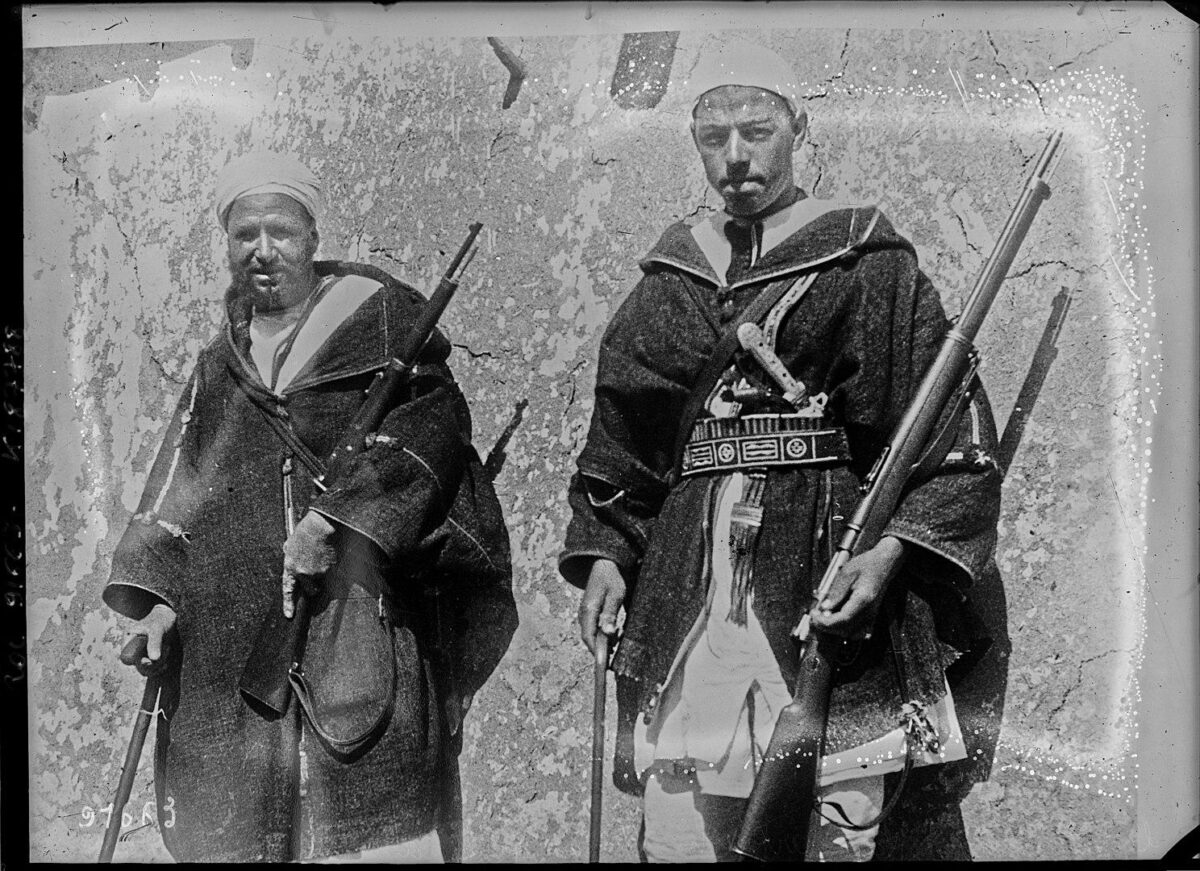Kaid Sarkash, carrying a Berthier carbine, with his son, carrying a M1893 Mauser rifle, taken from Spanish soldiers
From ‘Spanish Revolution: A Bulletin Published by the United Libertarian Organizations’, December 9, 1936, New York City
For a number of years the Spanish imperialists waged a ruthless campaign against the Moroccan tribes. Although succeeding with the help of French and British imperialists in breaking the fierce resistance of the native warriors, they must have left a rancorous resentment and a smouldering hatred in the wake of their punitive expeditions. How is it that the same gang of militarists succeeded in turning those very tribes into obedient instruments of their nefarious designs against the Spanish people?
We find an answer to this question in the information given by the “Revolution Proletarienne” of Nov. 10, on the attitude of the former Madrid government to the Moroccan problem. The picture drawn by this magazine is of the dismal, familiar kind: a cowardly democratic government, hiding behind a smoke screen of liberal and socialist phraseology, but failing at the same time in its elementary democratic duty of liberating the exploited colonial peoples; and on the other hand — clever Fascist demagogy turning to advantage those fatal mistakes. This is what the magazine has to say on this subject:
“During the two years following the proclamation of the Republic the liberals and socialists of the Republican government did nothing for the native population of Morocco. The same may be said about the government of the People’s Front which ignored this problem during all the five months of its stay in power, that is those that preceded the Fascist rebellion.
“Franco knew that it was necessary to have the Moroccans as their allies. He granted the Moroccans liberties which the Republic refused them. Franco, for instance, granted the native Moroccans the right to publish their own papers. But it is exactly this right that the Moroccans tried in vain to obtain from the People’s government. For a number of months the Moroccans kept on petitioning the government of the People’s Front about the issuance of a native paper in the Arabian language. The government did not as much as answer this demand. One of the first acts of Franco was to grant the Moroccans this demand.
“By now we may already reveal the fact that some native Moroccans wielding great influence in their country, known patriots but democrats at the same time, demanded that the Largo Caballero government (before the entrance of the anarcho-syndicalists into the government) make a definite promise of certain autonomous rights to the Moroccans if they succeed in liberating themselves from Franco’s rule. Those demands, although discussed by the Cabinet Council, were tabled after-wards, and the prominent Moroccans who sent out such feelers were not even answered.”
However, the entrance of the anarcho-syndicalists into the government has changed matters in this respect. According to the same magazine, the pressure of the anarcho-syndicalists resulted in the working out of a plan of full autonomy for Morocco, which is going to be made public very soon.
The Beginning of the End – Spanish Revolution (1937)
From ‘Spanish Revolution: A Bulletin Published by the United Libertarian Organizations’, February 8, 1937, New York City
Of late the Moors are beginning to show signs of unrest and disintegration as fighting units.
The Spanish press reports an increasing number of desertions, mutinies which have recently taken place on the civil war front.
Thus the CNT, the official daily of the Anarcho-Syndicalist Confederation of Labor, writes:
“In the Badajos sector a number of Moorish infantrymen were shot. They were caught in a mass attempt to cross the Portuguese border in order to escape further service in the Fascist army.
French Morocco (the border province of Oran) is becoming an open road for a wave of deserters. In some cases the latter bring with them ammunition and army equipment.”
In the rear recruiting becomes more and more difficult. Agents of the Franco government are assassinated by recalcitrant villagers. Thus the papers report of the murder of the chieftain of one of the tribes, who was killed by the Riffs because of his zeal in recruiting soldiers for the Moorish army in Spain.
Also
The Tragic Week in Catalonia, from Freedom (1909)
Bloodied Palestine, by Camillo Berneri (1929)
Mussolini’s War Upon East Africa, by Marcus Graham (1935)
Blood in Palestine, by Solidaridad Obrera (1936)
The Right of Peoples to Determine Themselves, by Solidaridad Obrera (1936)
What Can We Do?, by Camillo Berneri (1936)
Militians, Yes! But Soldiers, Never!, by various Spanish anarchist militias (1936)
An Interview with Durruti about the Militarisation of the Militia (1936)
Why Moors Help Franco, by George Padmore (1938)
The Lebanon Crisis, by War Commentary (1943)
The Kabyle Mentality, by Sail Mohamed (1951)
Long Live Free Algeria!, by the Federation Communiste Libertaire (1954)
García Oliver, Largo Caballero, and the Problem of Morocco, by Abel Paz (1996)
The April Uprising in Iraq, from Face to Face With the Enemy (2004)
Carrying the War into Africa?: Anarchism, Morocco, and the Spanish Civil War, by Danny Evans (2020)
Anarchism and Revolutionary Defeatism, by K. C. Sinclair (2025)
“Dissolve the army and immediately withdraw from Morocco.”
Workers at the CNT-FAI rally in Barcelona on May Day (1931)

